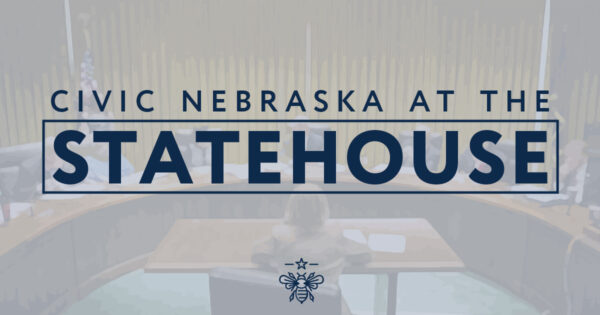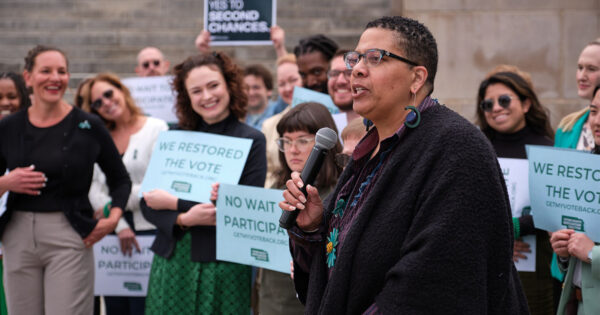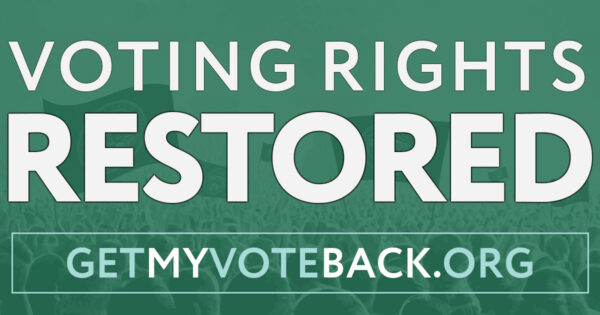Today, as we observe Women’s Equality Day – the annual commemoration of women earning the right to vote in 1920 –it is notable that in one short year, we’ll be marking a century since the adoption of the 19th amendment.
In other words: “The right of citizens of the United States to vote shall not be denied or abridged by the United States or by any State on account of sex.”

At 99 years old, women’s suffrage in the United States is such an afterthought that it’s difficult to believe it’s still not yet been a century since American women gained access to the ballot. In history’s big picture, 99 years is a blink of an eye. On the other hand, it’s been long enough for many American women – including Nebraskans – to take this hard-fought right for granted. By some measures, our state ranks poorly compared with others when it comes to political participation by women.
Women’s suffrage in the United States first gained prominence when Lucretia Mott and Elizabeth Cady Stanton organized the women’s rights convention at Seneca Falls, New York in 1848. Neither of them would live to see the passage of the 19th amendment.
Although 2020 is an important milestone in the struggle for women’s voting rights, it does not commemorate a century of voting rights for all American women. Although they have been central to the struggle, women of color would not immediately benefit from the freedoms that their white sister suffragists enjoyed in the 1920s.
Dr. Mabel Ping-Hua Lee led the suffragists’ march on horseback through New York City in 1912, but she would not obtain her voting rights until the passage of the Magnuson Act in 1943, which granted citizenship to Chinese immigrants.
In 1913, among a group of female lawyers marching for women’s suffrage in New York, was Marie Louise Bottineau Baldwin, a member of the Chippewa tribe. Natives would not be able to vote until the Snyder Act in 1924 resulted in full citizenship for tribal members, although they faced exclusionary state constitutional laws as late as 1962 when New Mexico became the last state to enfranchise Native voting rights.
Likewise, black women faced barriers that denied them their voting rights long after 1920. They were women like Ida B. Wells-Barnett, who famously defied organizers of a 1913 suffrage parade when they requested she and her members of the all-black Alpha Suffrage Club march at the back of the parade (so not to give offense to newly elected President Woodrow Wilson). When the parade began, Ida emerged from the crowd and marched shoulder to shoulder with white women.

It took the passage of the 24th amendment in 1964 and the Voting Right Act of 1965 to end poll taxes and literacy tests that were used to discourage both black men and women from voting in the South.
Given the struggles women have faced in gaining and maintaining their voting rights, it is discouraging to see how few women in Nebraska are utilizing this important tool in democracy. The latest Status of Women in the States scorecard by the Institute for Women’s Policy Research ranks Nebraska 37th in political participation. Only 49.4 percent of eligible women voters participate in Nebraska elections. Coupled with our lack of women as elected representatives, this meant Nebraska received a D from the organization for our overall political participation by women.
That’s the bad news. Here’s the good news: It’s never too late to get registered, get involved, and get to voting.
Over 40 organizations have joined to create the 2020 Women’s Vote Centennial Initiative. The group has resources for teachers, community leaders, activists, historians, and anyone interested in hosting events or activities connected to the anniversary. It is well worth visiting – and then acting. The best way for Nebraska women to celebrate the accomplishments of Stanton, Lee, Baldwin, and Barnett is to exercise the right those women worked and fought and struggled so hard to obtain.
Got five minutes right now? Check the status of your voter registration, or register using your driver’s license.
There is no more precious right than our right to vote. We know from being on our streets, in our schools, and in our neighborhoods that Nebraska women are engaged, informed, and active in their communities. Let’s work to ensure as many Nebraska women as possible honor the sacrifices and labor of our pioneering sisters – today, in 99 years, or in 999 years.
– Margaret Marsh



